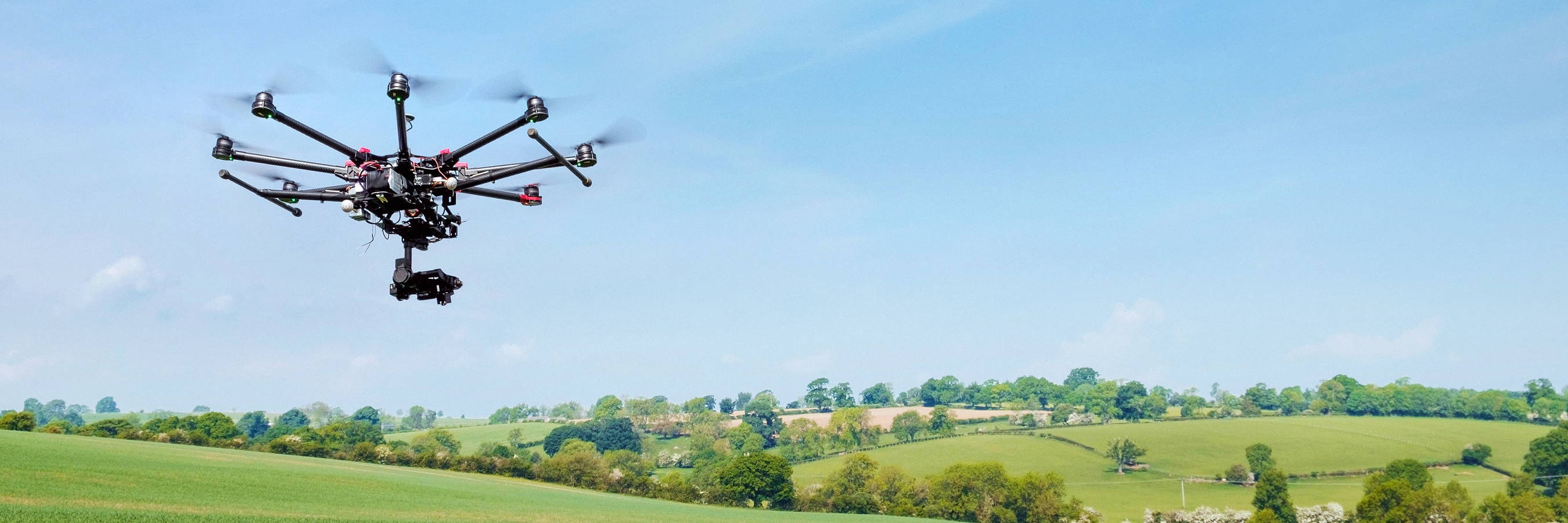Recent survey finds small U.S. farm owners are incorporating drone technology into their everyday agricultural tasks.
Every day, technology has a way of integrating itself into businesses when you least expect it. Take unmanned aerial vehicles (more commonly called drones) and their growing use in the field of agriculture. On larger farms, drones are being utilized for tasks like crop spraying since it’s estimated to be five times faster than traditional machines. But how are smaller farms taking advantage of this rapidly expanding technology? Are these farmers using drones for traditional tasks like planting, spraying, and irrigating crops? Or have more unique applications taken root? Munich Re surveyed roughly 200 farmers in the US who are utilizing drones to find out how this growing technology is transforming agriculture.
Where Are Drones Being Used?
To fully understand farm drone applications, we needed to discover what types of farms required drones in the first place. We found that 66% of the farms surveyed own properties that are less than 350 acres in scale. Due to this smaller size, mixed properties--both arable (primarily crops) and pastoral (primarily animals)--were the majority at 51%. A prevailing belief throughout the agriculture industry is that drones are most commonly used for crop applications and thus only needed on arable farms. However, our survey shows a nearly equal spread between mixed and specific properties (51% to 49%). This data proves drones must be helping small farms in more unique ways, beyond strictly traditional crop applications alone.
Reasons for Drones Being Used
We asked US farmers to tell us the most common reasons drones are used around their farms. Multiple answers could be submitted and the graph below details the highest utilizations. “Other” was available as an answer so farmers could list their own unique uses. While only 4% of the farmers surveyed chose “other,” the utilizations they listed were intriguing. Checking for predators, monitoring livestock, and protection from thieves were all listed as “other” applications. As a licensed commercial drone pilot, I could easily see these “other” uses quickly growing as farmers become more comfortable using the latest technology for their agribusiness.
How Often Are Drones Being Used?
With drones undertaking more responsibilities on farms, it wasn’t all that surprising to find weekly utilization was quite high. Of the 99 farmers who responded to this survey question, 31 cited daily use, 31 used drones multiple times a week, 21 used them weekly, 5 more than monthly, 2 monthly, and 9 less than monthly. This means nearly 84% of the farmers are using their drones weekly or more.
Why Does Drone Insurance Coverage Matter?
Based on our survey, a majority of farmers (76%) showed growing liability concerns in a variety of forms. Media coverage about drones malfunctioning and falling from the sky, harming property or people in the process, gives farmers real worry about how this technology could affect their business. Potential damage or injury from drones (17%) and potential violations of aviation regulations (16%) were common coverage concerns for farmers. Unexpectedly, the survey results also showed that more farmers were equally concerned with emerging risks like privacy issues (23%) and cyber security for the drones (20%). As drone utilization expands across small farms, so do the risks involving this broadening technology.
The survey data above shows that farmers are contemplating many standard and emerging exposures surrounding their drone technology. The benefits of a drone to a small farm far outweigh the risks, but agribusinesses need new policies that can help them with updated protection. Many commercial policies completely disregard drones as a coverage need or ignore emerging risks like privacy concerns. By updating traditional insurance policies to adequately protect farmers from these modern risks, insurance can become a valuable partner to farmers exploring this new technology.
Drone Utilization Moving Forward
Farmers are continuing to discover new ways to utilize drone technology and the advantages are becoming more apparent. Based on this survey’s findings, U.S. farmers are adapting drone utilization for many of their responsibilities. Large scale, industrial farms have already incorporated drones for daily tasks and small farms are following suit. In a short amount of time, drones could become common equipment throughout the agriculture industry, as ubiquitous as the modern day tractor or irrigation system.
This online survey was conducted for Munich Re in April 2018 and is intended to represent the views of 269 U.S. farmers who participated.









